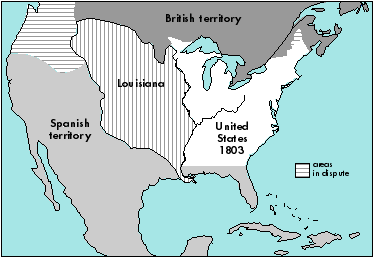April 20, 1803. (Lancaster, Pa.). Lewis updates Jefferson on preparations for the - plans for recruiting men, the purchase of boats, obtaining weapons (Jackson, 1: 37-41).
April 27, 1803. Jefferson writes Lewis enclosing a rough draft of instructions for Lewis to consider and suggest changes (Jackson, 1: 44).
April 30, 1803. United States purchases territory of Louisiana from France for approximately $15 million.

April 30, 1803.
United States purchased Louisiana from France. The purchase almost doubled the land area of the United States. It also meant that the Lewis and Clark expedition was in American territory for much of the trip.
June 11, 1803. (Philadelphia). Benjamin Rush writes Jefferson enclosing directions for Lewis on how to stay healthy during the expedition (Jackson, 1: 54-55).
June 19, 1803. (Washington). Lewis writes to his longtime friend William Clark giving him an overview of the expedition to the West and its objectives; he invites Clark to join him with equal pay and rank (Jackson, 1: 57-60).
June 20, 1803. Jefferson drafts written orders for Lewis to follow after the expedition leaves U.S. territory (Jackson, 1: 61-66).
July 15, 1803. (Pittsburgh). Lewis informs Jefferson that he has arrived in Pittsburgh and that all is well (Jackson, 1: 110).
July 18, 1803. (Clarksville). William Clark writes Lewis accepting his invitation to join the expedition to the West (Jackson, 1: 110-11). See August 28, 1803 letter p. 6.
July 18, 1803. William Clark to Meriwether Lewis"I received by yesterdays Mail, your letter of the 19th . . . . The enterprise &c. is Such as I have long anticipated and am much pleased with - and as my situation in life will admit of my absence the length of time necessary to accomplish such an undertaking I will chearfully join you in an 'official Charrector' as mentioned in your letter, and partake of the dangers, difficulties, and fatigues, and I anticipate the honors & rewards of the result of such an enterprise, should we be successful in accomplishing it. . . . My friend I do assure you that no man lives whith whome I would perfur to undertake Such a Trip &c. as your self" (Jackson, 1: 110-11).
July 24, 1803. (Louisville). Clark writes Lewis re-affirming his acceptance of Lewis' invitation and informs Lewis that he has engaged some possible recruits for the trip (Jackson, 1: 112-13). William Clark
William Clark was born in Virginia in 1770, the younger brother of General George Rogers Clark. In 1785, his family settled in Jefferson County, Kentucky. In 1792, Clark was appointed second lieutenant in the U.S. Army; he served under General Anthony Wayne and participated in the Battle of Fallen Timbers (1794). He was the captain of a rifle company in which Meriwether Lewis served. Clark resigned from the army in 1796 to focus on family affairs. In 1803, Lewis invited him to help lead the expedition to the Northwest. In 1807, Clark was appointed chief Indian agent and brigadier general of the militia for Louisiana Territory. He served as governor of Louisiana Territory. He died at St. Louis in 1838 (Holmberg, Brother, xxvii-xxx; Ambrose, 45).
July 24, 1803. (Louisville). Clark writes Lewis re-affirming his acceptance of Lewis' invitation and informs Lewis that he has engaged some possible recruits for the trip (Jackson, 1: 112-13).
